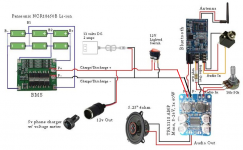Thanks guys. The grounds all connect together. I'm not running a ground line from device to device, but rather they all connect to a central point. I think so anyway.
When it comes to any wires that carry sound (bluetooth to pot to amp to speaker) i'm using shielded wire. I'm using the outside bare shield wire as the negative and the inner coated wire as the positive.
I should have some electrolytic capacitors around. What volt & mdf would you recommend? I have a 16v 100uF, and a 16v 220uF. Would either of those work? I also have some others if not.
Thanks!!

The BT module needs a good ground wrt the power amp module.
The highest currents are drawn by the amp module so wire power direct to the amp module and 'piggy back' the BT module power from this connection point using red/black twisted pair as per the edited diagram above and this ought to cure the ground loop noise problem you have.
It may be advisable to put capacitance across the amp module power input also, and possibly an RC or LC filter in series with BT module pos power feed.
Dan.
Wow, thanks for doing all that! I gave this a shot. I used a twisted wire pair to jump the power from the amp to the bluetooth. I didn't really get any noise reduction unfortunately. I tried with no capacitor, with a ceramic, and with an electrolytic. I don't have any filters around, so I didn't try that yet. I really appreciate your response just the same!
I'm going to try the DC-DC isolated converter with an inductor and capacitor, i'm just trying to figure out which one. I confirmed today that my bluetooth module will not run on 5v.
I'm going to try the DC-DC isolated converter with an inductor and capacitor, i'm just trying to figure out which one. I confirmed today that my bluetooth module will not run on 5v.
Aha, I just realised that I replied to a different thread recently, when I meant to reply to this thread! Fortunately it was someone else with the same issue. I have a similar issue with my BT module, and it's great to find out some ideas to resolve the issue. My BT board has balanced outputs, which are then converted to single-ended outputs by an Op-amp. Bypassing the op-amp and running the balanced audio directly to the amp resolves the issue, but this complicates some other things, such as the volume control with a pot, and also switching to the headphone input.
I'm still thinking through possibilities, but if the power supply separation works, then this would be a great solution.
A question - Can I test this with running the Bluetooth part of the circuit from a separate battery? Should I connect the ground from the main circuit through to the battery negative?
I'll be watching this thread with interest to hear how it goes.
I'm still thinking through possibilities, but if the power supply separation works, then this would be a great solution.
A question - Can I test this with running the Bluetooth part of the circuit from a separate battery? Should I connect the ground from the main circuit through to the battery negative?
I'll be watching this thread with interest to hear how it goes.
I am very happy to report that my issue was solved via a DC-DC isolated converter as suggested in this thread. The noise is 100% gone. Thank you!
My bluetooth board requires at least 6 volts, with 12v being optimal. In the end I purchased a isolated DC-DC converter that accepts a range of input voltages between 4.5v - 13.2v and outputs 12v. I used a multi-meter to measure the current of the bluetooth board, and the calculated that i needed < 2 watts, which is the max for the converter.
I also used a 47uH inductor at the positive output of the converter, and a 4.7uF ceramic capacitor across the positive and negative on the output after the inductor.
The DC-DC converter claims a typical efficiency of 84%. I'm not sure yet how much effect this will have on my battery life, but i expect it will be fine considering my setup.
Here are the exact components I used for my board:
DC-DC: TEC 2-0912
Inductor: Bourns 78F470J-RC
Capacitor: TDK FK26X7R1C475K
Surfdabbler, yes, you can test by providing a separate power supply to the bluetooth board.
My bluetooth board requires at least 6 volts, with 12v being optimal. In the end I purchased a isolated DC-DC converter that accepts a range of input voltages between 4.5v - 13.2v and outputs 12v. I used a multi-meter to measure the current of the bluetooth board, and the calculated that i needed < 2 watts, which is the max for the converter.
I also used a 47uH inductor at the positive output of the converter, and a 4.7uF ceramic capacitor across the positive and negative on the output after the inductor.
The DC-DC converter claims a typical efficiency of 84%. I'm not sure yet how much effect this will have on my battery life, but i expect it will be fine considering my setup.
Here are the exact components I used for my board:
DC-DC: TEC 2-0912
Inductor: Bourns 78F470J-RC
Capacitor: TDK FK26X7R1C475K
Surfdabbler, yes, you can test by providing a separate power supply to the bluetooth board.
Thanks for the update - that's great news that you got it sorted. Unfortunately I haven't had a lot of time for tinkering lately, and it will be another couple of weeks before I can get back to this project, but I'm looking forward to giving this solution a go. Thanks for all the details!
- Status
- This old topic is closed. If you want to reopen this topic, contact a moderator using the "Report Post" button.